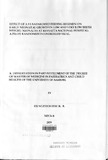| dc.contributor.author | Ngetich, Eric KR | |
| dc.date.accessioned | 2013-05-24T08:14:20Z | |
| dc.date.available | 2013-05-24T08:14:20Z | |
| dc.date.issued | 2009 | |
| dc.identifier.citation | Master of medicine in paediatrics and child health | en |
| dc.identifier.uri | http://erepository.uonbi.ac.ke:8080/xmlui/handle/123456789/25207 | |
| dc.description.abstract | Background: Introduction of standardized feeding regimens for neonates has
been associated with better weight gain, earlier attainment of full enteral feeds
and reduced risk of necrotizing enterocolitis (NEC) in high income countries.
Better weight gain is in turn associated with better short and long-term physical
and neurological outcomes for low birth weight neonates.
This pilot study was aiming to assess the effect of a standardized feeding
regimen on early neonatal growth.
Objectives: The primary objective was to determine the effect of a standardized
feeding regimen (SFR) on neonatal growth, measured at twenty eight days of
age, and obtain preliminary data on safety and feasibility. The specific objectives
were to describe and compare the average daily weight gain between the two
feeding groups, that is, the standardized feeding regime (SFR) group and the
current feeding regime (CFR) group at 28 days of age; to describe and compare
the proportion of neonates in the two feeding groups who had attained or
surpassed their birth weight by 21 days of age and to describe the proportion of
neonates that attained full enteral feeds at or before 7 days of age.
Design: Open randomized control trial.
Methods: Seventy two neonates with birth weights between 1000g and 1999g
were randomly assigned into two feeding arms, one(CFR) with 37 and the SFR
group with 35 babies. Initial measures taken included birth weights taken using
a digital weighing scale able to measure up to 10 grams. Those in the
intervention arm received enteral feeds according to a standardized feeding
regimen beginning within 4 hours of age for the 1500g -1999g subgroup and at
24 hours for the 1000g -1499g neonates. The SFR consisted of early introduction
of feeds and rapid increment in volume of feeds .The control group's feeding was
the current feeding regime (CFR) in the newborn unit in Kenyatta National
Hospital which mainly consisted of slow introduction of, and low volume
increment of enteral feeds.
Main outcome measure: Average daily weight gain calculated at 28 days of age.
Secondary outcomes were; time (in days) till regaining of birth weight, time to
attaining full enteral feeds and frequency of feed intolerance or NEe.
Data Analysis: Analysis was by intention to treat. Descriptive statistical and
analytical methods were used for data evaluation and results presentation.
Results: Seventy two neonates were recruited and randomly assigned to the two
feeding groups with thirty seven in the CFR group and thirty five in the SFR
group. Thirteen patients (18.05%) died, six (8.33%) developed feed intolerance
and one was lost to follow-up.
The baseline characteristics, including the number of males and females,
numbers in the weight subgroups and mean birth weight, between the two
groups were the same.
The neonates on the SFR had a mean weight gain of 14.1 g/kg/ day compared to
a mean weight gain of 9.8 g/kg/ day in the CFR group and this was a
statistically significant difference (p= <O.OO1).Thoseon the SFR also attained full
feeds earlier at a mean of 5.6 days compared to a mean of 7.0 days in the CFR
group and this was a statistically significant difference (p=0.002). Those babies
fed by the SFR regained their birth weight by a mean of 7.2 days compared to a
mean of 9.9 days in the CFR group and this too was statistically significantly
different(p=O .001).
The episodes of significant feed intolerance did not differ between the two
feeding regimes. There was no difference in mortality between the two feeding
regimes though the study was not powered to detect a difference between the
two groups.
Conclusions: There was a statistically significant weight gain advantage and
earlier attainment of full feeds and regaining of birth weight in the neonates fed
using the standardized feeding regime. The study did not find any difference in
the episodes of feed intolerance between the two feeding regimes. Mortality
between the two groups did not differ though the study was not powered to
detect a difference. | en |
| dc.description.sponsorship | University of Nairobi | en |
| dc.language.iso | en | en |
| dc.title | Effect of a standardized feeding regimen on early neonatal growth in low and very low birth weight neonates at Kenyatta National Hospital | en |
| dc.title.alternative | A pilot randomized controlled trial. | en |
| dc.type | Thesis | en |
| dc.description.department | a
Department of Psychiatry, University of Nairobi, ; bDepartment of Mental Health, School of Medicine,
Moi University, Eldoret, Kenya | |

